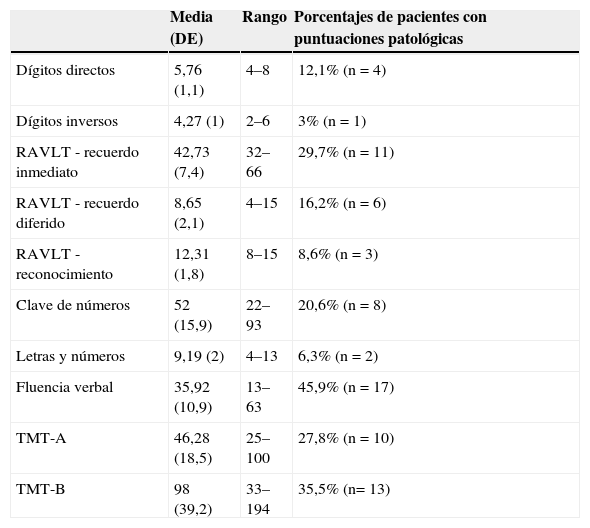Estudiar el rendimiento psicométrico de una muestra de pacientes afectados por el síndrome post-polio que manifiestan quejas cognitivas.
Pacientes y métodoLa muestra estaba formada por 37 pacientes (17 hombres) con síndrome post-polio atendidos en consulta externa de Neuropsicología. La edad media en el momento de la exploración neuropsicológica era de 55 años (DE: 4,58 años). El 59,5% recibía tratamiento farmacológico por la presencia de sintomatología ansioso-depresiva. Los resultados obtenidos por los pacientes en la exploración neuropsicológica fueron comparados con los baremos normativos a fin de identificar el porcentaje de pacientes con puntuaciones patológicas para cada uno de los test aplicados.
ResultadosLos pacientes presentaban puntuaciones patológicas en todos los test neuropsicológicos; siendo especialmente relevante el porcentaje de puntuaciones indicativas de alteración cognitiva en los test que valoraban velocidad de procesamiento cognitivo, aprendizaje verbal, fluencia verbal fonémica y flexibilidad cognitiva. No se observaron diferencias estadísticamente significativas en el rendimiento de los pacientes en función de la presencia o ausencia de sintomatología ansioso-depresiva.
ConclusionesLos pacientes afectados de síndrome post-polio que manifiestan quejas cognitivas presentan un rendimiento psicométrico inferior al de la población general.
To examine psychometric performance in a sample of patients with postpolio syndrome (PPS) with subjective cognitive complaints.
Patients and methodsThe sample consisted of 37 PPS patients (17 men) referred to our outpatient neuropsychological service. The mean age at the neuropsychological assessment was 55 years (SD: 4.58 years). A total of 59.5% was receiving pharmacological treatment for anxiety-depression. The results obtained by patients in the neuropsychological assessment were compared with normative data to identify the percentage of patients with pathological scores on the tests applied.
ResultsPatients with PPS had pathological scores on all the neuropsychological tests. A particularly significant finding was the percentage of patients with scores indicative of cognitive impairment in tests that assessed cognitive processing speed, verbal learning, phonemic verbal fluency and cognitive flexibility. No statistically significant differences were observed in patients’ performance depending on the presence or absence of anxiety or depression.
ConclusionsPatients with PPS and subjective cognitive complaints performed less well on neuropsychological assessment than the general population.
Artículo
Comprando el artículo el PDF del mismo podrá ser descargado
Precio 19,34 €
Comprar ahora







